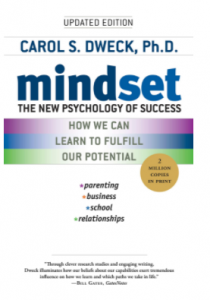Fixed vs Growth: The Two Mindsets That Shape Our Lives (IM 848)
Stanford psychologist Carol Dweck, in her remarkably insightful book Mindset: The New Psychology For Success, highlights the differences between the fixed and the growth mindsets. She believes that the "fixed mindset" assumes that our character, behavior, talents and creative ability is static and can't be improved in a meaningful way. A "growth mindset" on the other hand embraces challenges, sees failure not as a result of unintelligence.

A "fixed mindset" confirms the deterministic view of the world while the "growth mindset" confirms the greater sense of freewill. Carol Dweck found out that intelligence and personality can be developed and it is not an innate trait. She writes:
For twenty years, my research has shown that the view you adopt for yourself profoundly affects the way you lead your life. It can determine whether you become the person you want to be and whether you accomplish the things you value. How does this happen? How can a simple belief have the power to transform your psychology and, as a result, your life?
Believing that your qualities are carved in stone — the fixed mindset — creates an urgency to prove yourself over and over. If you have only a certain amount of intelligence, a certain personality, and a certain moral character — well, then you’d better prove that you have a healthy dose of them. It simply wouldn’t do to look or feel deficient in these most basic characteristics...….
I’ve seen so many people with this one consuming goal of proving themselves — in the classroom, in their careers, and in their relationships. Every situation calls for a confirmation of their intelligence, personality, or character. Every situation is evaluated: Will I succeed or fail? Will I look smart or dumb? Will I be accepted or rejected? Will I feel like a winner or a loser? . . .
There’s another mindset in which these traits are not simply a hand you’re dealt and have to live with, always trying to convince yourself and others that you have a royal flush when you’re secretly worried it’s a pair of tens. In this mindset, the hand you’re dealt is just the starting point for development. This growth mindset is based on the belief that your basic qualities are things you can cultivate through your efforts. Although people may differ in every which way — in their initial talents and aptitudes, interests, or temperaments — everyone can change and grow through application and experience.
Do people with this mindset believe that anyone can be anything, that anyone with proper motivation or education can become Einstein or Beethoven? No, but they believe that a person’s true potential is unknown (and unknowable); that it’s impossible to foresee what can be accomplished with years of passion, toil, and training...…
Furthermore, Dweck also argues that "fixed mindset" constantly seeks for approval and makes people do anything to get the approval while "growth mindset" creates a passion for learning rather than a hunger for approval. Dweck writes:
Why waste time proving over and over how great you are, when you could be getting better? Why hide deficiencies instead of overcoming them? Why look for friends or partners who will just shore up your self-esteem instead of ones who will also challenge you to grow? And why seek out the tried and true, instead of experiences that will stretch you? The passion for stretching yourself and sticking to it, even (or especially) when it’s not going well, is the hallmark of the growth mindset. This is the mindset that allows people to thrive during some of the most challenging times in their lives.
Dweck in her book explains more about the difference between these two types of mindsets and why one should choose "Growth Mindset" to succeed in life. She also explores how these fundamental mindsets form, what their defining characteristics are in different contexts of life.
PS: Here is more about the difference between fixed mindset and growth mindsets.


Leave a Reply
You must be logged in to post a comment.